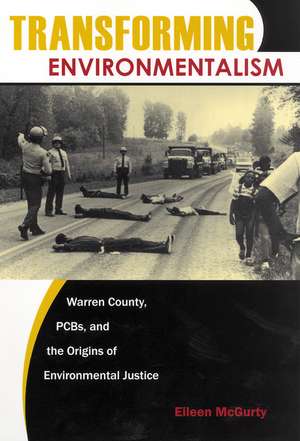Transforming Environmentalism: Warren County, PCBs, and the Origins of Environmental Justice
Autor Professor Eileen McGurtyen Limba Engleză Paperback – 11 sep 2009
Contemporary public policy circles are quick to acknowledge that environmental factors contribute to ill health and pose a particular threat to poor and minority communities. But public officials rarely examined the distribution of environmental hazards such as polluted air and contaminated water. In the 1980s, as toxic waste facilities proliferated, the environmental justice movement demanded that impoverished communities no longer be burdened by excessive environmental risks.
In Transforming Environmentalism, Eileen McGurty explores a moment central to the emergence of the environmental justice movement. In 1978, residents of predominantly African American Warren County, North Carolina, were horrified to learn that the state planned to build a landfill in their county to hold forty thousand cubic yards of soil that was contaminated with PCBs from illegal dumping. They responded to the state's plans with a four-year resistance, ending in a month of protests with over 500 arrests from civil disobedience and disruptive actions.McGurty traces the evolving approaches that residents took to contest "environmental racism" in their community and shows how activism in Warren County spurred greater political debate and became a model for communities across the nation. Transforming Environmentalism explores how the specific circumstances of the Warren County events shaped the formation of the environmental justice movement and influenced contemporary environmentalism.
In Transforming Environmentalism, Eileen McGurty explores a moment central to the emergence of the environmental justice movement. In 1978, residents of predominantly African American Warren County, North Carolina, were horrified to learn that the state planned to build a landfill in their county to hold forty thousand cubic yards of soil that was contaminated with PCBs from illegal dumping. They responded to the state's plans with a four-year resistance, ending in a month of protests with over 500 arrests from civil disobedience and disruptive actions.McGurty traces the evolving approaches that residents took to contest "environmental racism" in their community and shows how activism in Warren County spurred greater political debate and became a model for communities across the nation. Transforming Environmentalism explores how the specific circumstances of the Warren County events shaped the formation of the environmental justice movement and influenced contemporary environmentalism.
Preț: 171.21 lei
Preț vechi: 254.08 lei
-33% Nou
Puncte Express: 257
Preț estimativ în valută:
32.76€ • 35.03$ • 27.32£
32.76€ • 35.03$ • 27.32£
Carte indisponibilă temporar
Doresc să fiu notificat când acest titlu va fi disponibil:
Se trimite...
Preluare comenzi: 021 569.72.76
Specificații
ISBN-13: 9780813546780
ISBN-10: 0813546788
Pagini: 326
Ilustrații: 5 illustrations. 5 illustrations
Dimensiuni: 152 x 229 x 15 mm
Greutate: 0.31 kg
Ediția:None
Editura: Rutgers University Press
Colecția Rutgers University Press
ISBN-10: 0813546788
Pagini: 326
Ilustrații: 5 illustrations. 5 illustrations
Dimensiuni: 152 x 229 x 15 mm
Greutate: 0.31 kg
Ediția:None
Editura: Rutgers University Press
Colecția Rutgers University Press
Notă biografică
Eileen McGurty is a senior lecturer and associate chair of the graduate program in environmental sciences and policy at Johns Hopkins University.
Cuprins
List of Tables and Figures
Preface
1. The Significance of Warren County
2. Regulating Toxic Chemicals, PCBs, and Hazardous Waste
3. The Collective Action Frame of "Not in My Backyard"
4. Constructing Environmental Racism: Political Opportunities, Social Networks, and Collective Action
5. The Environmental Justice Movement: Maturation and Limitations
6. Warren County Revisited
7. Epilogue
Notes
Index
Preface
1. The Significance of Warren County
2. Regulating Toxic Chemicals, PCBs, and Hazardous Waste
3. The Collective Action Frame of "Not in My Backyard"
4. Constructing Environmental Racism: Political Opportunities, Social Networks, and Collective Action
5. The Environmental Justice Movement: Maturation and Limitations
6. Warren County Revisited
7. Epilogue
Notes
Index
Recenzii
In sharp and penetrating prose, McGurty recounts the central role of Warren County, North Carolina, in the rise of the environmental justice struggle. She lifts the discussion above the class versus race debate and exposes the movement's progression from a fledgling local battle to a national movement that has influenced public policy.
Transforming Environmentalism is an expertly written and engaging analysis of one of the seminal events in environmental history, public policy, and political protest. It constitutes an important contribution to the environmental justice literature and should be considered mandatory reading for scholars, students, and activists alike committed to understanding the fundamental role of citizen activism in making American be what America should be.
Descriere
Transforming Environmentalism explores a moment central to the emergence of the environmental justice movement. In 1978, residents of predominantly African American Warren County, North Carolina, were that the state planned to build a land fill to hold forty thousand cubic yards of soil contaminated with PCBs from illegal dumping. They responded with a four-year resistance, ending in a month of protests with over 500 arrests from civil disobedience and disruptive actions. Eileen McGurty traces the evolving approaches residents took to contest environmental racism in their community and shows how activism in Warren County spurred greater political debate and became a model for communities across the nation.
